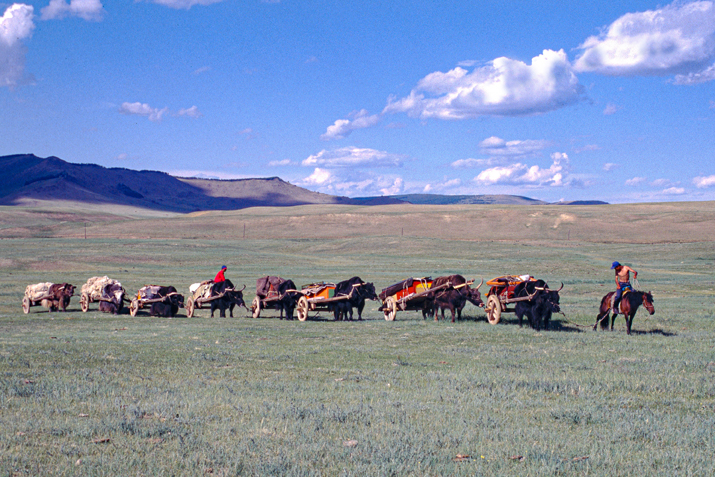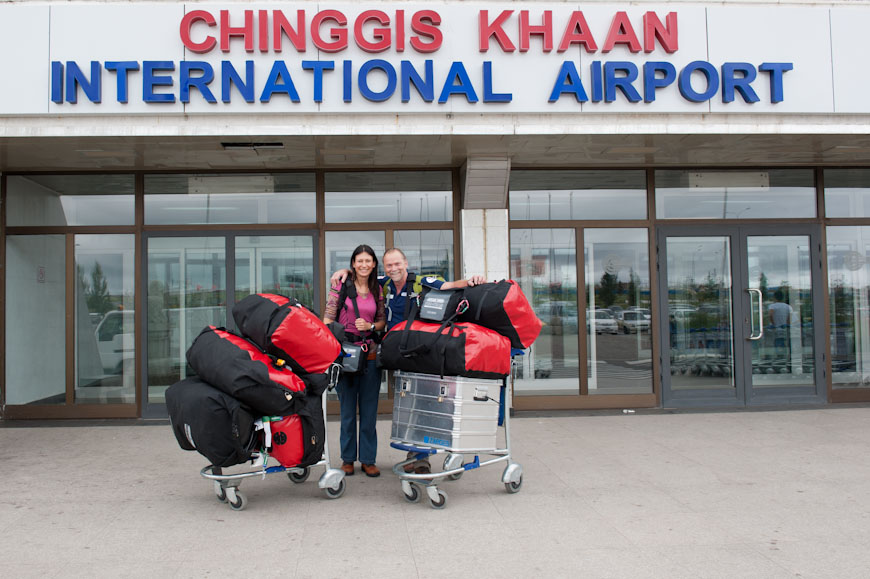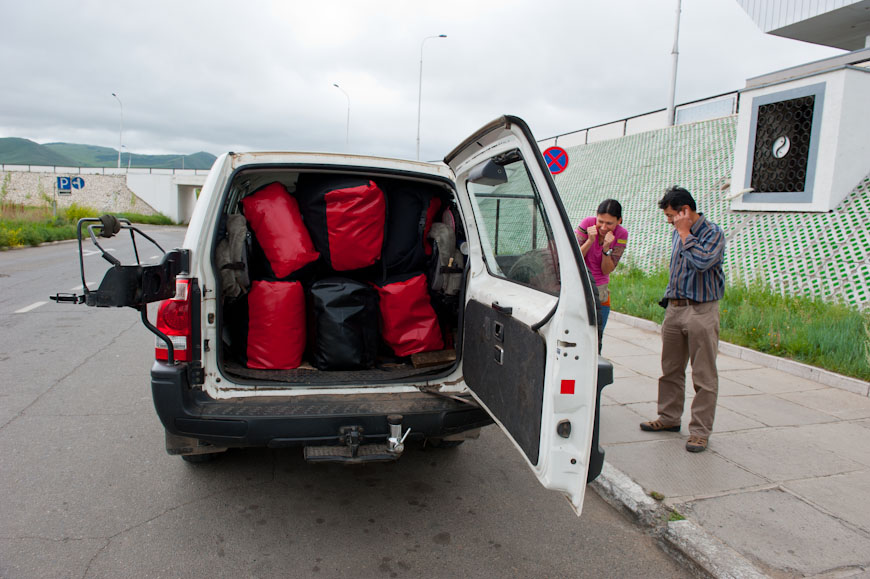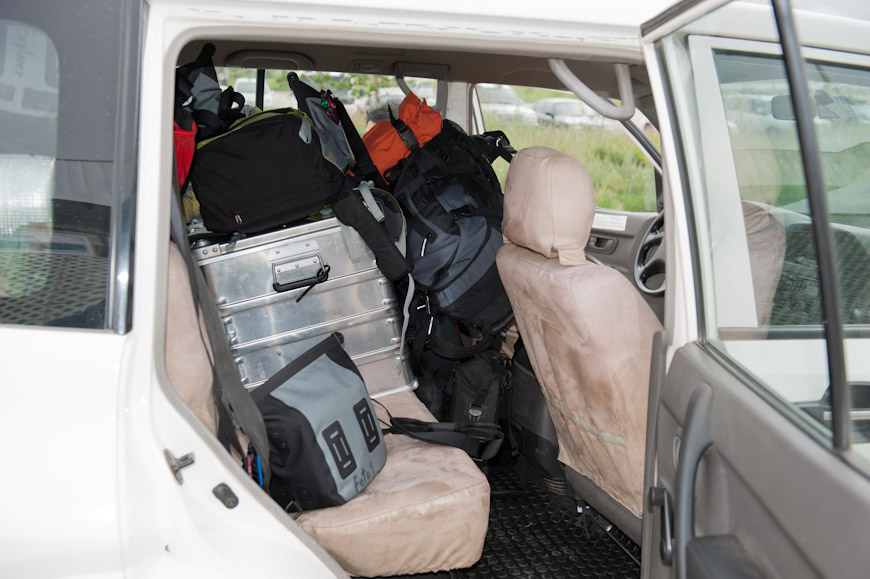
A journey supported by helping hands
N 47°55'513'' E 106°55'559''
Day: 1-2
Sunrise:
05:19 h/05:20 h
Sunset:
8:38 pm/20:37 pm
Temperature – day (maximum):
28 °C
Temperature – day (minimum):
25 °C
Temperature – Night:
19 °C
Latitude:
47°55’513”
Longitude:
106°55’559”
Maximum height:
1315 m above sea level



Finally, after the Mount Everest of challenges and preparations, the day of departure has arrived. At 6 a.m. we crawl out of our warm beds, put on our travel clothes, check our travel documents again and take a last look at each room. Nothing forgotten. Then we lug a total of six large Ortlieb duffel bags, a Zarges box and about 50 kg of hand luggage to the front of the house. Our friend Pfleidi, who has been driving us to the airport or train station at the start of a big trip for many years, parked his car with us last night. I was supposed to test load it this evening, but we were too tired last night.
“And all this is supposed to fit in the car?” my parents wonder, having got up so early to say goodbye to us. After I’ve loaded five of the six bags weighing around 27 kilograms and the aluminum box into the station wagon, it’s full to the brim. “And where do you want to stow the duffel bag?” asks Tanja, pointing to the large piece of orphaned luggage. “I wish I knew,” I reply, panting wildly with exertion. Over the course of many years of travel and expeditions, I have developed into a sizing and packing specialist and have always been able to accommodate everything. This time, however, I am close to despair. “I should have test loaded last night,” I say and try again. In the meantime, time is running out. Under pressure, I try to stuff the duffel bag between the Zargesbox and the car roof with my feet, but even brute force gets me nowhere. “We need to reload. Maybe we should leave the bulky aluminum box and pack the contents in another duffel bag,” I suggest. “I don’t know. We need the box to lock up our valuables in the yurt,” Tanja reminds me. Once again I try to squeeze the duffel bag into the narrow gap with all my might. While I pull this time Tanja pushes and lo and behold, suddenly the thing moves and we push it in. “I wouldn’t be surprised if the car roof bulges outwards,” I say jokingly. Between our feet and in a few gaps we still find space for two daypacks weighing around 15 kg each, two laptop bags, two camera bags, a satellite phone bag and a lens bag.
In the meantime, Pfleidi and his wife Jessy have also arrived. We say goodbye to my parents and Jessy. My mother gives me a big hug. “Take care of yourselves and please come back safe,” she says quietly. “We’ll do it,” I reply confidently. The journey to Frankfurt passes without any traffic jams. We reach the airport on time. Pfleidi, who drove us, helps us to wheel the 180 kg of equipment plus about 50 kg of hand luggage to the Air China counter on three luggage trolleys. We are the first passengers. Somewhat excited, I take the written confirmation from Air China out of my backpack. It allows us to check in a total of 160 kg free of charge. Since Air China charges 55 euros for every kg of excess baggage, that would be 5,500 euros for 100 kg of excess baggage. A fortune that we cannot possibly pay. A few weeks ago, I called the Air China station manager and asked for help. “Write me exactly what you need,” he said. I then wrote an application in which I also described our expedition plans. It takes a while and lo and behold, I got a positive response. Tanja and I were as happy as little children. What fantastic support from an airline that doesn’t even ask for anything in return! A thousand thanks at this point.
Of the five check-in desks, all but ours were now occupied. “I hope we don’t have to stand at the end of one of the long queues of people with all our luggage,” says Tanja as a ground stewardess comes over and waves us over in a friendly manner. “The computer only shows 20 kg of excess baggage per person,” says the woman. I then hand her the written confirmation. “I’ll have to check,” she says kindly and goes to one of the other counters to ask a Chinese woman. Tanja and I are a bit nervous. What happens if this letter is suddenly no longer valid? “If they now have to stick to the 20 kg in the computer, we still have 80 kg excess baggage without hand luggage,” I say and start calculating the total in my head. “No problem,” says the lady as she sits down at her table again a little later. A load off our minds.
“What, a year in Mongolia? Oh, you really are to be envied,” says the friendly woman as we chat animatedly during baggage check-in. When I tell her that we are planning to ride to the last reindeer nomads to spend the winter with them, she stops her work for a moment and looks me in the eye. “We would like to report on their culture, their rites, customs and shamanism before this tribe no longer exists. Maybe we can help them with our work. That would be our greatest goal,” I explain, to which the woman is so moved that she has tears in her eyes.
After we have checked in all our luggage without any problems, we say goodbye to the stewardess. Then we hug Pfleidi and thank him for his help. “Have a good trip,” says the dad-to-be.
The rest of the journey proceeds without any incidents. At the security check and in the waiting room, nobody takes any notice of our extensive hand luggage. There is not even a measuring frame for the permitted size and weight of hand luggage. In good spirits and very relieved to be able to take a total of 230 kg of equipment with us, we sit in the plane a little later and take a last look at our homeland for a long time. Then clouds take away our view. Exhausted from the weeks of preparation, we fall asleep immediately.
After a short stopover in Beijing, we land in Ulan Bator at around 10:00 am. Tanja finds a gap between the people streaming out of the machine and disappears from my field of vision. I am the last one to leave the plane with all my bags. “Ah, there you are,” I’m pleased to see Tanja at the end of a long corridor. “Have you got everything?” she asks. “Sure,” I reply and count my three camera bags and rucksack. “Oh God! No! I’ve forgotten my laptop!” I shout in horror and rush back into the plane. Inside, I walk down the rows of seats and when I reach our seat, an empty luggage compartment yawns at me. The shock goes so deep into my limbs that I immediately start to sweat. Now someone has stolen my laptop, I think, and I can’t believe it. A thousand thoughts flash through my head in seconds. What an immense amount of work it was to install the right software on it and, above all, to program it specifically for live reporting. Apart from the fact that the computer was only loaned to us by a sponsor and doesn’t even belong to us. Desperate, I walk one row of seats further back to look in the luggage compartment. Nothing. I look down at the seat and see that the laptop bag is lying there alone. Tanja must have taken the bag out of the overhead compartment to put it on the seat for me. Relief flows through my body. I grab the precious piece and hurry back to Tanja. “It’s never happened to me before that I’ve forgotten something on an airplane,” I say. “You noticed it in time,” she replies.
We walk to baggage reclaim and hope that the six duffel bags and the Zargesbox have really arrived. It would be unthinkable if one of them went missing or if customs pulled out one or more of the bags to check the contents. Not that we have illegal things with us, but we bring in food, tools, saddles, etc. Lots of things that look different to the average piece of luggage when you go through it. Before passport control, we report to the immigration authorities as advised in Germany. “With this visa you have to report to the immigration authorities in Ulan Bator within seven days,” says the officer, checking our visas thoroughly. Then we get a stamp and are in Mongolia for the time being.
“I can already see the first bags!” I shout happily as my gaze falls on the conveyor belt. “Everything is there,” Tanja beams. We organize two large luggage trolleys and walk through customs. “What have you got with you?” a customs officer wants to know. “Expedition equipment such as saddles, tents, sleeping bags etc. Everything to survive summer and winter in their country,” I explain. “Good luck then,” he replies with a smile and waves us through without taking another look at the duffel bags. As soon as we step outside, Ganbold waves to us. Ganbold helped us a lot on our last trip to Mongolia. He was the one who picked us up from the outskirts of Ulan Bator in his jeep when we arrived there with our bikes, completely frozen out after a long and exciting journey. He also provided us with his niece’s apartment, where we were able to break up our bicycle expedition, which took us 15,000 km from Germany to Mongolia, he helped us with the procurement of various large cardboard boxes that we needed for our bicycles and much more.
Now it stands there and is as familiar to us as if no time had passed. We hadn’t actually expected to be picked up, although we had left a voicemail for Ganbold’s German friends, Gertrud and Günter, shortly before our departure, asking them to inform Ganbold of our arrival. And lo and behold, it worked. Now we don’t have to bother with a cab driver to get our belongings to U.B..
Traffic like in Cairo
“You’ve got a lot of luggage,” says Ganbold with a laugh and leads us to his jeep, which we load up to the roof
Moments later, we find ourselves on the main road towards the city center. We can hardly believe we are back here. For the third time now. During our first Mongolia expedition in 1996, we rode 1,600 km through the highlands and experienced some incredible adventures. It was then that I became aware of the Zataan tribe. A small nomadic people who still live with reindeer today and use them as pack animals and mounts. Since then, I have never let go of the idea of spending a winter with them at least once in my life. Thoughtfully, I look out of the window at the wild traffic. In 1996 there were hardly any cars here, they were rather rare and you could stroll along the street with confidence. Today, the traffic is soon comparable to that in Cairo. Two lanes are quickly turned into four lanes, four into eight. Drivers speed and tailgate, honk their horns and show no consideration for others. As a pedestrian, you’re in a very bad position. They are downright ignored. If you want to cross the road, you have to have all your lights on to avoid being run over. “Tüüüühhht! Tüüüühhht! Tüüüühhht!” It honks like crazy behind us. Ganbold stopped at a red light. This seems to annoy the driver behind us. Ganbold shouts loudly out of the driver’s window and sticks out his fist with his little finger pointing upwards. The Mongols use this sign like we use the middle finger. “Tüüüühhht! Tüüüühhht! Tüüüühhht!” is the loud reply. When it turns green, we drive on. Suddenly the aggressive honker overtakes us, drives close to our side, shouts out of the window and throws a lit cigarette at our car. Ganbold also reacts by shouting and swearing. The driver cuts us off in such a way that Ganbold can only avoid an accident by braking hard. Then the fat and expensive jeep in front of us disappears into the traffic jam.
Ganbold takes the incident in his stride, at least that’s how he seems to us. A little later, we park in front of his niece’s apartment. We agreed with her by email that the accommodation would be free for the duration of our stay and how much it would cost. “That’s what I call good organization,” I praise us, because it would be impossible to check into an expensive hotel room with all that luggage. Panting, we get the 230 kg of heavy equipment up to the fifth floor. When the door opens, we almost feel as if we are at home.
Before Ganbold leaves, we talk a little about the situation in Mongolia, about whether he has already received parcels from Germany, about buying horses and how important a dog will be for our expedition. “Only one parcel has arrived so far.” “I hope it didn’t cost any customs duty?” I ask. “Yes, yes. 90,000 tugrik” (53 euros), he says. Since the enclosed invoice from our sponsor Rapunzel is issued for 120 euros and Mongolia charges 15% import tax, which is actually only charged if the parcels are sent by a forwarding agent and not DHL, we are a little surprised at the price. “Yes, they now charge duty on everything. It used to be different, but now the government knows how to make money,” explains Ganbold. “What kind of dog do you actually want?” he wants to know. “One that can take good care of our horses,” I answer because I don’t know which dogs in this country are well suited for such a job. “You’re right about that. Horses like to be stolen. A husky would be best. They’re great dogs. Far too expensive here in the U.B. It used to be different. Nobody was interested in huskies, but today the dog has become fashionable. If you don’t know where to take your dog after the trip, I’d be happy to take him,” he offers. “Oh, that sounds good. If we can’t take him home with us, it’s good to know where our future dog will find a good home,” Tanja replies. Our conversation turns a little more to the endangered red deer, Przewalski’s wild horses and snow leopards. “Even the marmot is now threatened with extinction. People simply hunt far too much and don’t abide by the bans,” explains Ganbold.
“If another package arrives, I’ll let you know,” says Ganbold a little later. I give him the 90,000 Tugrik and another 30,000 (18 euros) for the trip. “Thank you for everything,” we say and say goodbye.
We use the afternoon to get a chip for our cell phones and to stock up on food. Then we go back to the apartment and unpack a bit more of our equipment. As we have slept very little over the last few days, we go to bed at 10:00 am, 4:00 pm German time, and fall into a deep sleep in a matter of seconds.
We look forward to your comments!

